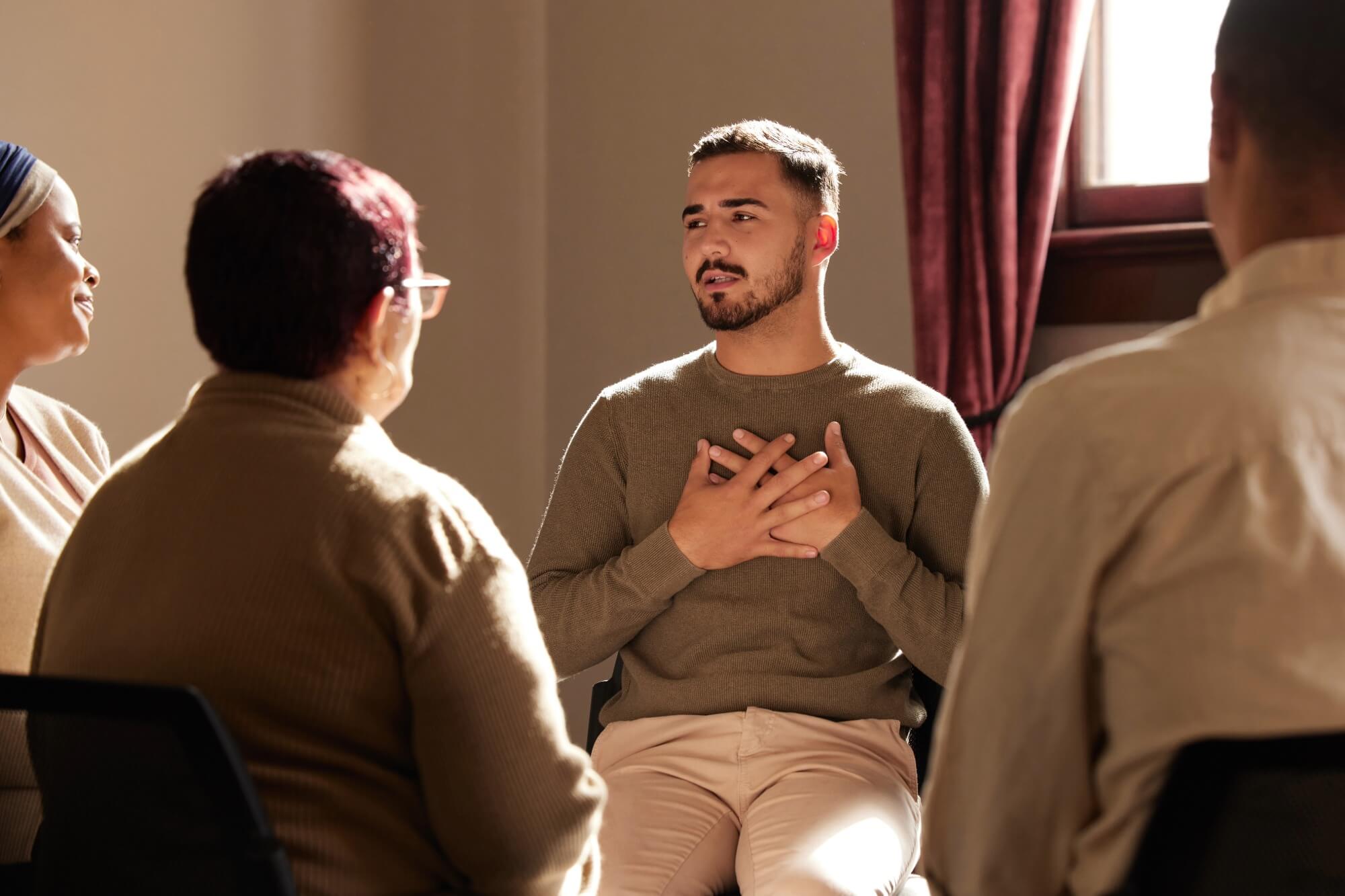Same Day, Weekend, and Evening Appointments Available!
.webp)
Post-traumatic stress disorder (PTSD) is a complex mental health condition that can develop after experiencing or witnessing a traumatic event. Whether caused by military combat, sexual assault, childhood abuse, unexpected death, natural disasters, or other overwhelming experiences, PTSD can affect every part of a person’s life.
PTSD therapy isn’t about forgetting what happened. It’s about creating a safe space to process traumatic experiences, reduce emotional pain, and work toward trauma healing. At Louis Laves-Webb, LCSW, LPC-S & Associates, we offer PTSD therapy in Austin, TX, to help individuals reconnect with themselves through care, compassion, and evidence-based practices.
PTSD is a mental health condition that arises after a person is exposed to a traumatic event that overwhelms their ability to cope. While not everyone exposed to trauma develops PTSD, many people experience symptoms such as flashbacks, emotional numbness, intrusive thoughts, anxiety, or hypervigilance long after the event has passed.
Post-traumatic stress disorder can also involve co-occurring challenges like depression, substance abuse, or relationship problems. These symptoms may interfere with work, intimacy, and a person’s ability to feel safe and connected.
Whether your trauma is recent or years in the past, trauma therapy can help you begin the process of recovery.
Understanding the signs of post-traumatic stress disorder is an essential first step toward healing. PTSD affects individuals differently, but it typically involves disruptions in mood, behavior, memory, and overall well-being. If left untreated, these symptoms can severely impact daily life, relationships, and a person’s ability to function at home, work, or in social settings.

Adults and children with PTSD may frequently relive the original traumatic event through flashbacks, distressing dreams, or intrusive thoughts. These episodes can feel as vivid as when the trauma originally occurred and may be triggered by sights, sounds, smells, or even internal cues like strong emotions or stress. The body may react physically with panic symptoms such as a racing heart or sweating, even in a safe environment.

Avoiding reminders of the trauma is another common symptom. This might include steering clear of people, places, conversations, or activities that relate to the event. Over time, this pattern can lead to isolation, emotional numbness, or a loss of interest in previously enjoyed activities. Some individuals may appear disconnected or distant from loved ones, adding strain to personal relationships.

PTSD often leads to heightened alertness and a constant feeling of being “on guard.” This hypervigilance can interfere with sleep, focus, and daily routines. Individuals may startle easily, experience irritability or anger outbursts, and feel constantly unsafe, even in familiar settings. These symptoms can be especially challenging when combined with co-occurring disorders like anxiety or depression.

Many people with PTSD struggle with ongoing emotional distress, including low self-esteem, guilt, shame, or difficulty feeling joy. They may develop negative beliefs about themselves or others and find it hard to trust or connect. It’s also common to feel detached from reality or unable to recall key parts of the trauma.
These PTSD symptoms can ebb and flow over time and may be worsened by stress, additional traumatic experiences, or untreated mental health conditions. If you recognize these signs in yourself or someone you care about, seeking trauma therapy or PTSD treatment can be a powerful step toward recovery.
Unlike PTSD, which typically develops after a single traumatic event, Complex PTSD (C-PTSD) arises from prolonged or repeated trauma over time. This can include childhood abuse, long-term domestic violence, captivity, or other situations where a person feels trapped and powerless. These experiences affect not only how a person feels but also how they view themselves and the world around them.
At Louis Laves-Webb, we understand that treating trauma is not one-size-fits-all. We provide a trauma-informed environment where clients can process their experiences at their own pace and move toward deeper healing and self-understanding.

When trauma occurs over an extended period, such as childhood abuse or domestic violence, it can evolve into complex trauma, or C-PTSD, requiring specialized treatment methods.
PTSD is often accompanied by anxiety, depression, or substance abuse. Integrated approaches in therapy help treat both PTSD and related conditions for better long-term outcomes.
Trauma can affect a person’s ability to manage emotions. Learning to identify, express, and regulate emotions is a key part of trauma counseling.
PTSD can cause relational issues and affect family member dynamics. Therapy supports rebuilding trust and creating healthier connections through family therapy sessions and group therapy.
At Louis Laves-Webb, we understand that no two trauma journeys are alike. That’s why our Austin therapists use a range of evidence-based practices to meet each individual’s unique needs.

Eye movement desensitization and reprocessing (EMDR) helps reprocess traumatic memories using bilateral stimulation. EMDR therapy supports trauma healing by reducing the emotional charge of traumatic experiences.
CPT is a powerful post-traumatic stress disorder treatment that addresses the harmful beliefs people often develop after trauma. This structured therapy helps people shift those beliefs and find clarity.
A form of cognitive behavioral therapy, prolonged exposure therapy gradually reintroduces trauma-related thoughts or situations in a controlled way, reducing avoidance and fear.
Internal Family Systems Therapy explores how past experiences shape current emotions, especially for those dealing with childhood trauma or identity-related pain. IFS allows for deep healing through understanding inner parts of the self.
Traditional talk therapy and narrative therapy offer opportunities to explore your trauma story, gain insight, and rewrite the narrative from a place of power and growth.
This body-focused approach supports the nervous system’s natural ability to regulate and discharge stress after traumatic experiences.
Religious Trauma therapy is an approach that helps clients process spiritual abuse, shame, and identity struggles rooted in religious environments, creating space for healing and personal meaning.
Connect with others through group therapy in a supportive environment. Share your experiences and receive validation, tools, and encouragement from peers walking similar paths.
Family therapy or couples counseling sessions support family members impacted by PTSD and help restore connection and understanding. We offer in-person and virtual sessions for greater flexibility.
Post-traumatic stress disorder (PTSD) can result from a wide range of traumatic events. At Louis Laves-Webb, LCSW, LPC-S & Associates, we provide trauma counseling for individuals impacted by different forms of trauma, each requiring unique care and sensitivity.
Our Austin therapists work with each individual to acknowledge the traumatic event(s), reduce symptoms, and begin the path to healing.
.webp)
Trauma affects people differently. We tailor PTSD therapy to meet the unique needs of diverse populations, ensuring a supportive environment for all.

Military veterans often carry the invisible wounds of combat, loss, and long-term stress. Our veteran trauma therapy offers a supportive, nonjudgmental space with therapists who previously served, to help you process these experiences and begin healing alongside someone who understands.
First responders are repeatedly exposed to traumatic situations in their line of duty. They often suppress emotional responses in order to function professionally. Our therapy provides a confidential, structured space to process the weight of this exposure.
Women may be more likely to develop PTSD after trauma and often face unique challenges linked to sexual assault, societal expectations, and caregiving stress. Our gender-affirming therapy acknowledges and addresses these layered issues.
Chronic abuse often results in complex trauma and emotional numbing. Survivors may struggle with trust and boundaries and feel overwhelmed by daily life. Our broad range of therapeutic interventions, including art therapy, helps process these experiences in a safe, validating space.
Younger clients may struggle to verbalize their trauma, instead showing behavioral changes, sleep disturbances, or academic difficulties. Our Austin child and adolescent counseling team offers compassionate support for youth using trauma-informed and developmentally appropriate techniques.
Members of the LGBTQIA+ community may face compounded trauma due to discrimination, rejection, or abuse. We offer LGBTQIA+ affirmative therapy that provides validation, safety, and strategies for self-acceptance and recovery.
Forced migration, cultural loss, and past violence can lead to PTSD and identity disconnection. We offer inclusive therapeutic interventions to help individuals rebuild a sense of security, process traumatic events, and navigate life transitions.
Systemic racism, cultural trauma, and generational harm can contribute to PTSD in BIPOC individuals. Our therapists acknowledge these realities and offer supportive environments that affirm identity, promote resilience, and guide trauma healing.
Surgeries, chronic illness, and ICU experiences can leave lasting psychological wounds. We use trauma counseling and art therapy as tools to access and gently resolve fear, helplessness, and trauma stored in the body.
Sudden or unexpected death can trigger PTSD symptoms like hypervigilance, intrusive thoughts, and disorientation. We provide support through grief-informed therapy that honors your loss while helping you reclaim emotional balance.
We’re proud to serve the Austin area and beyond with accessible care, compassionate support, and a commitment to your personal growth.
Our Austin counseling services are open to anyone experiencing trauma, including:
Beginning trauma therapy may feel daunting, but our compassionate team is here to walk with you every step of the way. Here's what the PTSD treatment process typically includes:
Your journey starts with a comprehensive intake session where we explore your trauma history, current PTSD symptoms, mental health background, and therapeutic goals.
You’ll be matched with a qualified Austin therapist based on your unique needs and preferences. Our team includes trauma specialists with experience in treating PTSD, complex trauma, and co-occurring disorders.
We develop a trauma-informed treatment plan using evidence-based practices such as cognitive behavioral therapy (CBT), EMDR therapy, cognitive processing therapy (CPT), internal family systems (IFS), and more.
Sessions are available in person at our Austin offices or virtually for clients across Texas. We offer flexible scheduling to make care as accessible as possible.
Your treatment plan will evolve as your healing progresses. We regularly assess goals, symptom improvement, and therapy fit to ensure comprehensive treatment for your well-being.
Therapy for PTSD is about more than symptom relief. It’s about restoring a sense of self, safety, and connection.
Healing is possible. With time, the right treatment methods, and a supportive environment, PTSD symptoms can become manageable, and personal growth can thrive.

At Louis Laves-Webb, LCSW, LPC-S & Associates, we bring compassionate, trauma-informed care to individuals navigating the complexities of PTSD and related mental health challenges.
Our team includes experienced social workers and therapists who specialize in treating trauma and co-occurring conditions with an integrative approach that draws on evidence-based practices, tailoring each treatment plan to meet your unique needs.
With flexible scheduling, in-person and virtual sessions, and a welcoming space rooted in safety and personal growth, our Austin-area counseling practice makes therapy more accessible and meaningful. Healing is possible—and we’re here to help you reclaim your well-being, one step at a time.
.webp)
You’ve served—now it’s time to be supported. Our Veteran PTSD Therapy includes LGBTQIA+ Affirmative care, creating space for veterans of all identities to heal in a respectful, trauma-informed setting.
Connect with an LGBTQIA+ Affirmative Therapist
You don’t have to carry your trauma alone. At Louis Laves-Webb, we provide PTSD therapy in Austin, TX, that’s rooted in compassion, science, and personalized care. Whether you prefer in-person or virtual sessions, our team of social workers and licensed therapists will meet you where you are.
Our goal is to help you reduce distress, build resilience, and move toward lasting wellness. We offer both short-term and long-term care based on your preferences and healing pace.
If you're ready to start the journey, contact us today. You deserve relief, growth, and a future no longer defined by your past.